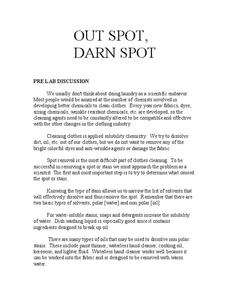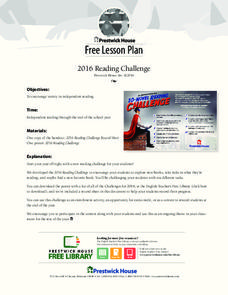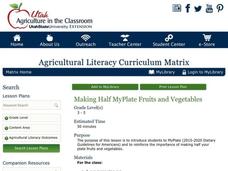Serendip
Out Spot, Darn Spot
Encourage your classes to be laundry helpers! Learners explore the chemistry of stain removal with a lab investigation. By identifying the components of the stain, they identify the most effective solute for its removal.
Classics for Kids
Instrumental Sounds
What sound does a piccolo make? What's the difference between a violin and viola? What family does a timpani belong to? Take a tour through the different sections of an orchestra with an interactive reference tool.
Science Matters
Lotusland
It's time for a field trip! Scholars take their new-found knowledge of adaptations and seed dispersal on a field trip to a local botanical garden. They gain an up-close look at how ecological interdependence works in a distinct...
Western Education
Math Poems
The logic, rhythm, and beauty of math sometimes get lost amidst numbers and variables. Amplify math's lyricism with a poetry project that uses metaphors and similes to compare mathematical concepts to other images.
K20 LEARN
Transpiring Trees: Plant Transpiration and the Water Cycle
Looking for a tree-rific addition to your water cycle unit? Teams of young foresters examine the role of transpiration in the water cycle through a week's worth of activities. Pupils analyze how trees take in and transport water during...
K20 LEARN
Water We Going To Do? Floodplains And Watershed Management
How has human activity affected Earth's watersheds? An action-packed lesson plan, part of the K20 Center, examines water's ability to go with the flow regardless of what is in its path. Scholars build model watersheds, examine time-lapse...
Generation Rx
Medication Safety Patrol: Pharmacy Crossword Puzzle
Nine pages set to a pharmaceutical theme offers scholars the chance to complete five activities. Worksheet pages include a crossword puzzle, drawing, an object sort, and math puzzles using addition, multiplication, and division.
Teach Engineering
News Flash!
Extra, extra, read all about it! Scholars research information on endangered species and produce a news report to share their findings with the rest of the class. In groups, they then consider engineering solutions to problems on habitat...
Teach Engineering
Live Like an Animal
When your parents say that your room's a pig sty, tell them about biomimicry. The sixth installment of a nine-part Life Science unit has scholars research the shelters used by animals in the natural world, like turtle shells. Using the...
Teach Engineering
Design Inspired by Nature
Let nature guide your engineering designs. By taking apart a flower, pupils learn about reverse engineering. They use the results to brainstorm designs for new products or ideas. This is the seventh installment of a nine-part Life...
Teach Engineering
Sugar Spill!
Sugar isn't good for you, but it's great for yeast! Scholars design an experiment to investigate how variables affect the rate of sugar consumption in yeast. The last installment of a nine-part Life Science unit considers how scientists...
Teach Engineering
Extinction Prevention via Engineering
It's time to save endangered species through engineering. The third instructional activity in a nine-part Life Science unit has young environmentalists study species extinction. An engaging discussion leads to some ideas on how to use...
Science 4 Inquiry
The Ups and Downs of Populations
As the reality of population decline across many species becomes real, pupils learn about the variables related to changes in populations. They complete a simulation of population changes and graph the results, then discuss limiting...
Science 4 Inquiry
At the Top: A Bald Eagle's Diet
Bald eagles are opportunistic predators and eat fish as well as raccoons and other mammals. Pupils learn about bald eagle diets through a simple simulation and videos. They collect and analyze data to understand the adaptability of this...
Generation Rx
Medication Safety Patrol: Activity Stations
Four stations challenge scholars to show what they know about the safety of taking and storing medications. Small groups rotate to read and answer questions regarding prescriptions drugs, examine prescription labels, identify appropriate...
Generation Rx
Medication Safety Patrol: Trivia Game
It trivia time! Small groups work collaboratively to answer questions all about medication safety. Groups earn points with each correct response, and as the ultimate game changer, they wager all or a portion of their points on one final...
Prestwick House
Reading Challenge
One of the big challenges of assigning independent reading is helping class members find a book to read. Another is encouraging readers to read a variety of genres. Never fear, help is here in the form of a quest that asks individuals to...
Chandler Unified School District
Art Masterpiece: Leonardo’s Inventions—Leonardo da Vinci
Leonardo da Vinci is the focus of a hands-on activity that encourages scholars to become inventors. Pupils brainstorm and sketch their idea, compose a detailed depiction using a mirror writing technique, and antique the paper for a...
Agriculture in the Classroom
Making Half MyPlate Fruits and Vegetables
Establish healthy eating habits with a lesson focused around MyPlate's food recommendations and the importance of eating fruits and vegetables. Through class discussion and worksheet completion, scholars discuss the best choices of foods...
Advocates for Youth
What Reduces Sexual Risks?
Teens don't have the ability to see around all of the corners of their decisions, some of which can affect the rest of their lives. Help them understand the implications of risky sexual behavior, including sexually transmitted diseases...
Harper Collins
The World of Ramona
Bring the fun and whimsy of Beverly Cleary into your classroom with a teaching guide created to accompany the Ramona series. The guide offers several ideas for classroom use, including independent reading, reading aloud, and literature...
Howard Hughes Medical Institute
Central Dogma and Genetic Medicine
Scientists work every day to find solutions to genetic diseases. Scholars learn about the process of gene sequencing, mutations, and the results. They explore genetic diseases and therapies to intervene and help and, through case...
Nuffield Foundation
Assessing Human Hearing
Young scientists explore hearing through multiple experiments, demonstrations, and activities. They focus on the changes in hearing over a lifetime, how we can determine where a sound is coming from, and the ability to filter noises.
Howard Hughes Medical Institute
Alzheimer’s Disease: Piecing Together the Evidence
5.7 million Americans live with Alzheimer's disease. With limited funding for research, where should scientists focus? Young scientists learn about current research and create their own questions. They then decide the best areas to focus...
Other popular searches
- Boston Tea Party Invitation
- Letter Writing Invitation
- Writing Invitations
- Writing an Invitation
- Birthday Invitations
- Invitation Writing
- Creating an Invitation
- Esl Writing Invitation
- Making Invitations
- Party Invitations
- Teacher Letter of Invitation
- Spanish Invitations

























